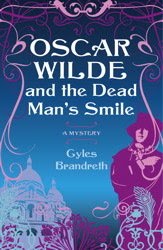In Brandreth's lastest page-turner, Oscar Wilde and the Dead Man's Smile, the playwright and amateur sleuth finds adventure in America and Paris. A series of seemingly random events, including a mysterious death at sea, leads Oscar to discover a horrifying secret --- one that may bring him closer to his own last chapter than anyone could have imagined. The previous books are Oscar Wilde and a Death of No Importance and Oscar Wilde and a Game Called Murder.
 How did it come about? How did the idea of creating mysteries involving Oscar Wilde and Arthur Conan Doyle come to me? It's a long story, so I will try to keep it short.
How did it come about? How did the idea of creating mysteries involving Oscar Wilde and Arthur Conan Doyle come to me? It's a long story, so I will try to keep it short.Since I was a boy, I have been an admirer of both the works of Oscar Wilde and the adventures of Sherlock Holmes. About ten years ago, in the late 1990s, by chance, I picked up a copy of Memories and Adventures, the autobiography of Arthur Conan Doyle, published in 1924, and discovered, on page 94, that Arthur Conan Doyle and Oscar Wilde were friends. I was amazed. It would be hard to imagine an odder couple.
They met in 1889. They were brought together by an American publisher, J M Stoddart, who happened to be in London commissioning material for Lippincott's Magazine. Evidently, Oscar, then 35, was on song that night and Conan Doyle, 30, was impressed --- and charmed. The upshot of the evening was that Mr. Stoddart got to publish both Arthur Conan Doyle's second Sherlock Holmes story, The Sign of Four, and Oscar Wilde's novel The Picture of Dorian Gray, and I was inspired to write the first of "The Oscar Wilde Mysteries."
My first story begins on the afternoon of the day of Wilde and Conan Doyle's first encounter. Oscar calls on a house in Cowley Street, Westminster, expecting to meet up with a friend --- a female friend, as it happens, a young actress.... Instead, in a darkened upstairs room, fragrant with incense, he discovers the naked body of a boy of sixteen, his throat cut from ear to ear.
Wilde, established poet and wit, "the champion of aestheticism" (and happily married to Constance and living in Tite Street, Chelsea, with their two sons), turns to Conan Doyle, doctor and writer of detective fiction, "the coming man," for help --- but Conan Doyle quickly discovers that when it comes to the art and craft of amateur sleuthing Oscar Wilde has very little to learn from Sherlock Holmes. Wilde is overweight and apparently indolent (more Mycroft than Sherlock Holmes), but his mind is amazing: his intellect is as sharp as his wit. Oscar Wilde, in his own way, is as brilliant as Sherlock Holmes --- and just as Holmes had his weakness for cocaine, Wilde has his weaknesses, too.
Famously, Wilde was a brilliant conversationalist. He was, also, by every account, a careful listener and an acute observer. And he had a poet's eye. He observed: he listened: he reflected: and then --- with his extraordinary gifts of imagination and intellect --- he saw the truth.... What makes Wilde particularly attractive as a character to write about is that he was such a fascinating and engaging human being. What makes him particularly useful --- and credible --- as a Victorian detective is that he had extraordinary access to all types and conditions of men and women, from the most celebrated to society's outcasts, from the Prince of Wales to common prostitutes.
Dr. Arthur Conan Doyle is central to Oscar Wilde and the Dead Man's Smile --- as he will be to the sequels in the series --- but, in my book, he is not Wilde's Dr. Watson. That role falls to one Robert Sherard, a journalist, poet, ladies' man and Wilde's first, most frequent and most loyal biographer. Sherard first met Wilde in 1882 in Paris and, throughout their friendship, which lasted until Wilde's death in 1900, kept a detailed journal of their time together.
As a child I felt close to Oscar for a special reason. I was a pupil at Bedales School, where, in 1895, Cyril, the older of the Wildes' two sons, had been at school. The founder of Bedales, John Badley, was a friend of Wilde's, and was still alive and living in the school grounds when I was a boy.
John Badley told me, "Oscar Wilde could listen as well as talk. He put himself out to be entertaining. You know, he said, 'murder is always a mistake. One should never do anything that one cannot talk about after dinner.' He was a delightful person, charming and brilliant, with the most perfect manners of any man I ever met. Because of his imprisonment and disgrace he is seen nowadays as a tragic figure. That should not be his lasting memorial. I knew him quite well. He was such fun."
More than a century after his death, I am still having fun in his company and as you read my Oscar Wilde Mysteries I hope you will, too. As Oscar once said, "There is nothing quite like an unexpected death for lifting the spirits."
---Gyles Brandreth

